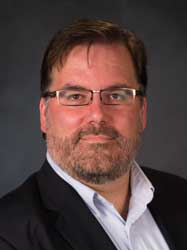Column by John Muenzberg, lecturer of philosophy
Some of the most satisfying moments in teaching is when a student is inspired by your course and the material encourages a new way of thinking about the world. Sometimes students will express amazement that they have a new way to interpret their lives.
Recent work in education has emphasized the importance of key concepts in learning new disciplines. They are called “threshold concepts.” A threshold concept is knowledge that is key to understanding a discipline but also forces a reinterpretation about the world in general. Since it forces a reinterpretation of the world, the concepts have been described as both troublesome and irreversible. They are troublesome because they cause intellectual upheaval and change. They are irreversible because once they are learned, it is difficult to go back to an old way of thinking. Current pedagogy encourages using threshold concepts to improve the quality of lower-level classes.
Such a conception of higher education fits in well with Murray State’s University Studies curriculum. Another activity that can transform your interpretation of the world is studying abroad. Studying abroad (or, at minimum, traveling abroad) is not valuable because there is some specific information that you need through the program. Rather, the experience of studying in a foreign country changes the way you think about people, cultures and nations.
One way studying abroad is similar to a threshold concept is that the experiential aspect of studying abroad adds viewpoints a textbook cannot provide. These viewpoints can be part of the curriculum or from the extracurricular experiences.
There are many things you can learn about German history or French management practices in the classroom, but the experience of observing the historical sites or talking to managers will add to the textbook learning in subtle yet important ways. As a personal example, I have taught an ethics course a few dozen times. This coming winter term, I hope to take students to London and Edinburgh to examine how ethical theory informs our understanding of both war and reasons for peace. On one hand, there is nothing in the course that requires us to travel specifically to London or Edinburgh. On the other hand, the experiential application, whether in London, Berlin or Beijing, will add an embodied experience to the theory that will transform the class material.
The extracurricular experiences from studying abroad can also transform the way you see the world. Meeting with people in foreign countries challenges your assumptions and preconceptions. Simply walking in a foreign city highlights the differences from American cities and can help you understand that society’s priorities and history.
After examining the differences between people, one comes to see how much we have in common. Strange food and confusing experiences can be fun. Upon reflection, one realizes we are able to navigate and live in these foreign environments precisely because human beings are so similar. A truly “foreign” people would have nothing in common with us. Most places you travel to are different but not absolutely foreign.
These experiences can transform a student. They are troublesome because they challenge our assumptions about our society and ourselves. They are transformative because they lead you to reinterpret your world. They are irreversible because once you see more of the world, you will see your own nation differently. And after you see your nation differently, there is little chance you will revert to your prior conceptions.
Studying abroad may not fit the theory of threshold concepts exactly, but the effect is the same. The Spring Study Abroad Fair is April 11. There are many possible ways to study abroad. Ideally, they will transform the way you interpret yourself and the world as much as your courses do.






























































































